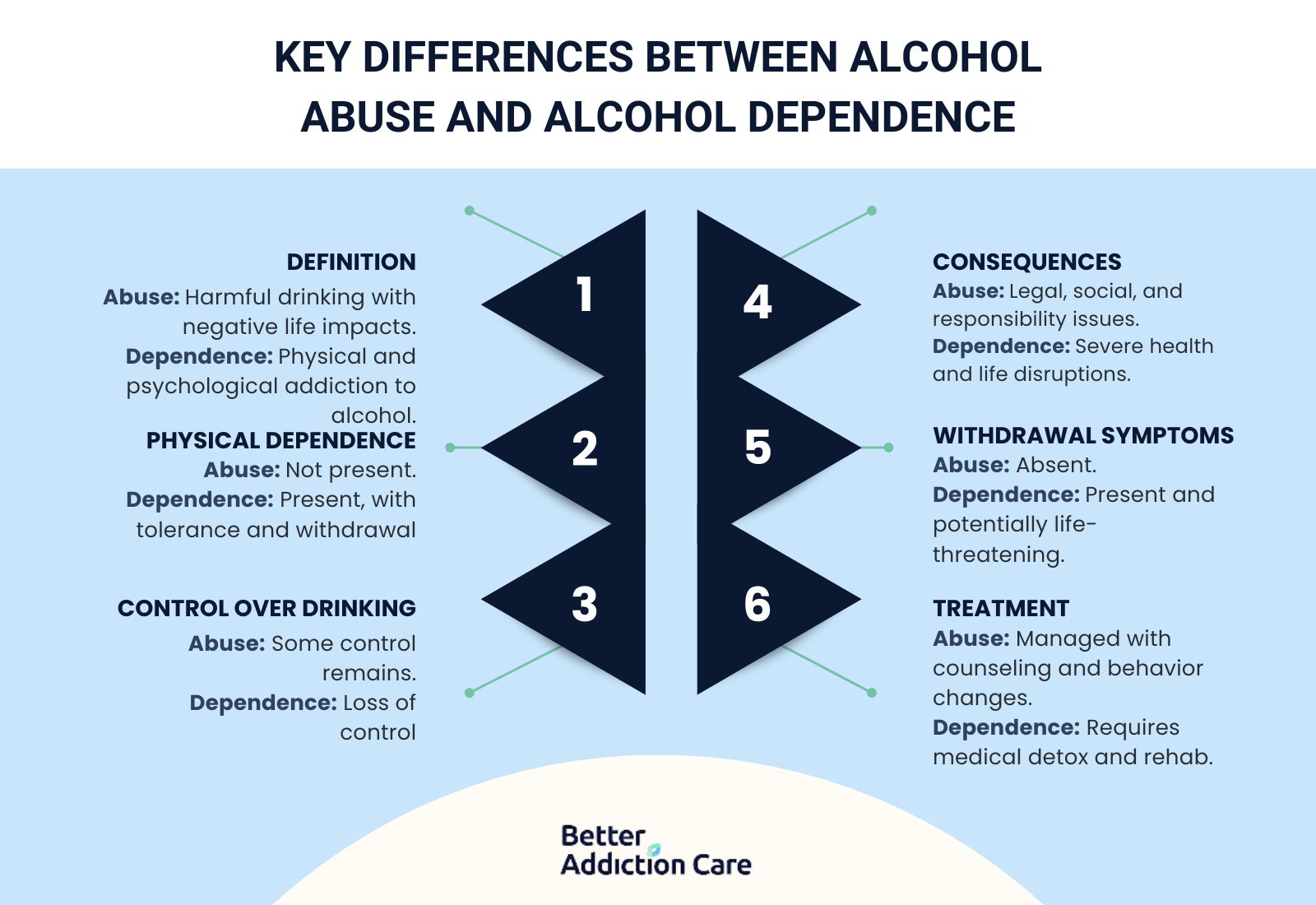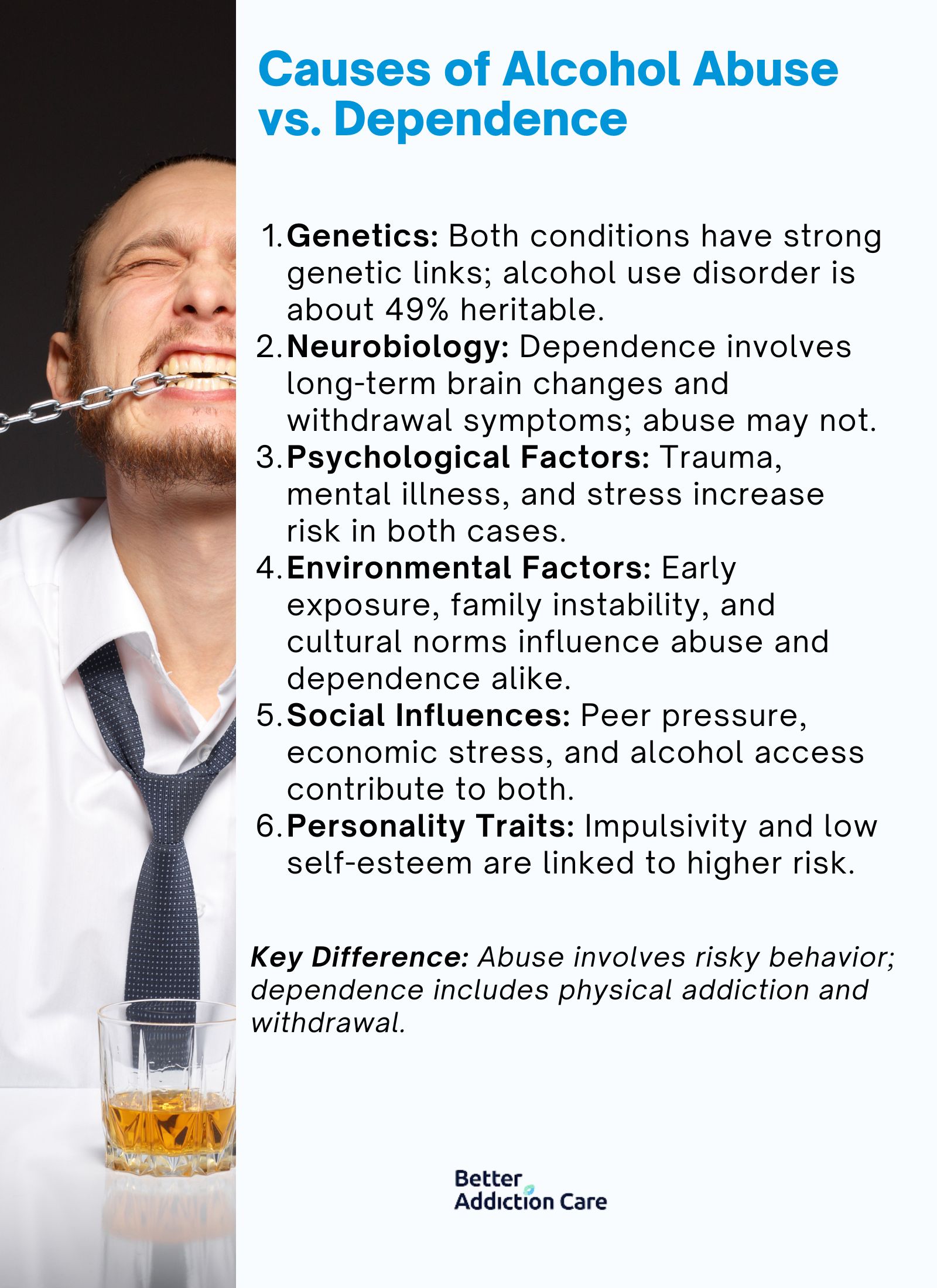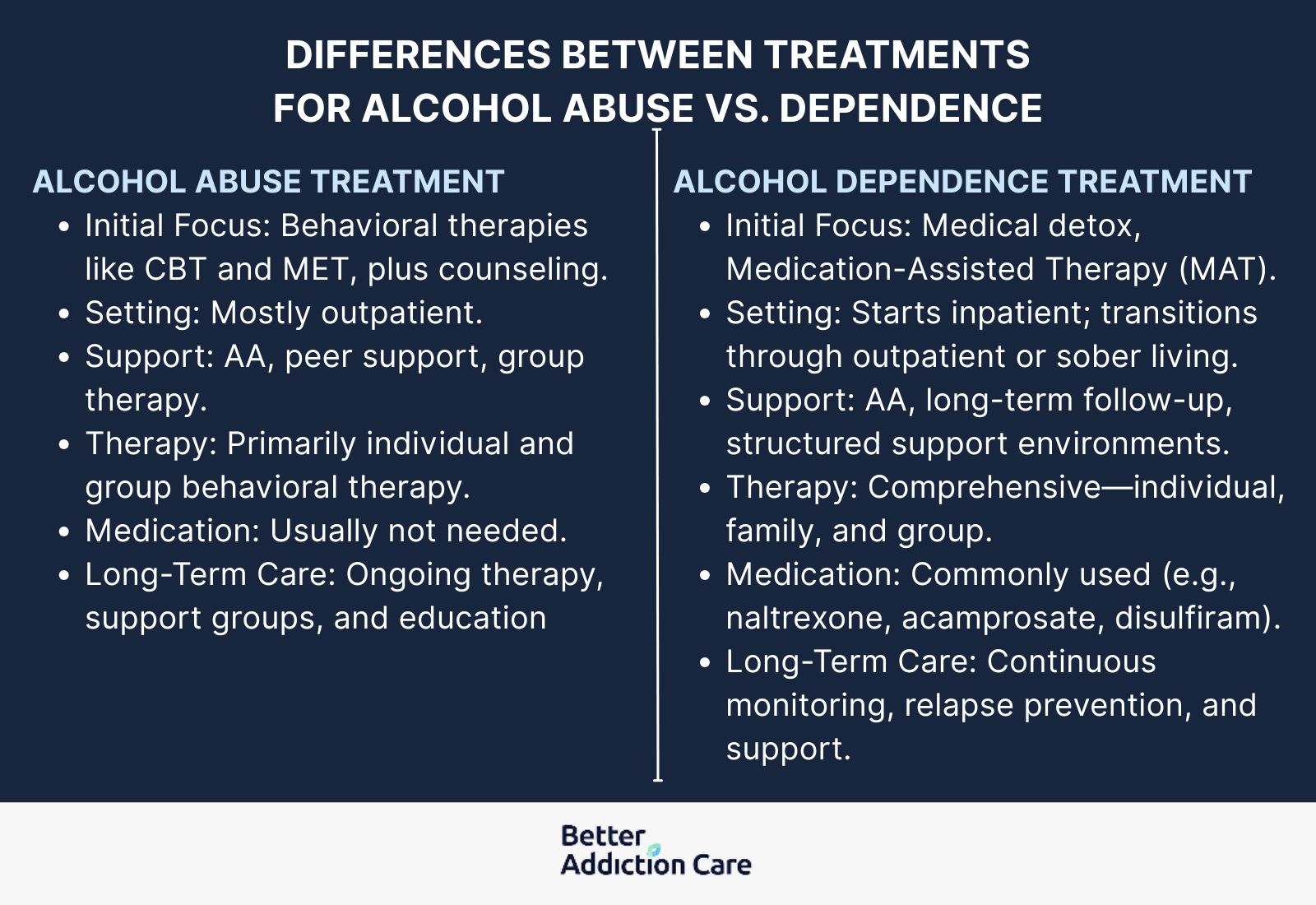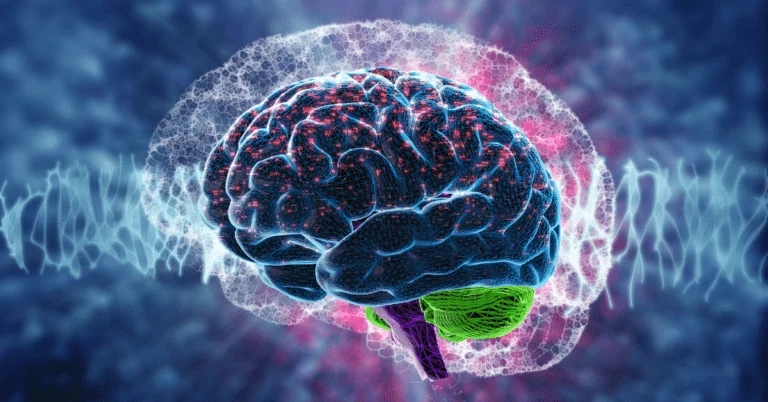Alcohol Abuse vs Dependence
Differences between alcohol abuse and alcohol dependence are marked by distinct characteristics and consequences. Alcohol abuse involves harmful drinking patterns that negatively impact various life aspects, while alcohol dependence entails physical and psychological reliance on alcohol.

Physical dependence is absent in alcohol abuse. Physical dependence is present in alcohol dependence, accompanied by tolerance and withdrawal symptoms. Individuals with alcohol abuse maintain some control over drinking behavior. In contrast, individuals with alcohol dependence lose all control over their drinking.
According to the 2023 National Survey on Drug Use and Health (NSDUH), 28.9 million people ages 12 and older (10.2% in this age group) had Alcohol Use Disorder (AUD) in the past year.
Consequences of alcohol abuse include neglect of responsibilities and legal issues, while dependence leads to severe health problems and persistent drinking despite harm. Withdrawal symptoms are absent in abuse but are life-threatening in dependence. Treatment for alcohol abuse includes counseling and support groups, while dependence requires comprehensive treatment, including detoxification and rehabilitation.
What is Alcohol Abuse?
Alcohol abuse is a pattern of drinking that negatively impacts a person's relationships, responsibilities, and health. It typically involves regularly disregarding important obligations at work, school, or home due to alcohol consumption, resulting in poor performance across these areas. People who abuse alcohol engage in risky behaviors, such as driving or operating machinery while intoxicated, significantly increasing their chances of accidents and injuries.
Alcohol abusers frequently experience legal problems related to DUIs, violence, and other alcohol-related offenses. Alcohol abuse causes interpersonal difficulties, including recurring arguments with family members, strained friendships, and challenges in maintaining personal relationships. Despite recognizing negative consequences, alcohol abusers continue drinking, further damaging their personal and professional lives.
Alcohol abuse does not always lead to physical dependency. However, alcohol abuse substantially harms health and relationships. Early intervention prevents progression into severe alcohol dependence, which requires intensive treatment for sobriety. Recognizing signs of alcohol abuse in oneself or loved ones minimizes negative impacts and prevents the development of more serious alcohol use disorders.
What is Alcohol Dependence?
Alcohol dependence is a chronic medical condition characterized by an inability to control alcohol consumption due to both physical and psychological reliance on alcohol. Also known as alcoholism or alcohol use disorder (AUD), it develops when regular alcohol consumption creates changes in brain chemistry, leading to tolerance, withdrawal symptoms, and compulsive drinking behaviors.
Key indicators of alcohol dependence include developing tolerance (needing more alcohol to achieve the same effects), experiencing withdrawal symptoms when not drinking (trembling, sweating, nausea, anxiety), drinking larger amounts or for longer periods than intended, persistent failed attempts to cut down, spending excessive time obtaining or recovering from alcohol, abandoning important responsibilities, and continuing to drink despite negative health and social consequences.
Severe alcohol dependence leads to dangerous withdrawal symptoms, including seizures and delirium tremens. Medical supervision during detoxification is essential. Alcohol dependence affects millions of Americans across all demographics. Treatment for alcohol dependence requires a combination of medical detox, counseling, behavioral therapies, and ongoing support.
What Are The Differences Between Alcohol Abuse vs. Dependence?

The differences between alcohol abuse and dependence include the nature of the drinking patterns, the presence of physical addiction, and the severity of the consequences experienced by individuals.
Alcohol abuse involves harmful drinking that negatively affects various life aspects without physical addiction, while alcohol dependence, or alcoholism, includes both physical and psychological reliance on alcohol, marked by tolerance, withdrawal symptoms, and a complete loss of control over drinking.
Alcohol abuse presents as problematic drinking with a lack of control. This behavior results in neglected responsibilities, legal issues, and relationship problems. Treatment involves counseling, support groups, and behavioral modifications.
Alcohol dependence signifies a complete loss of control over drinking. This condition includes physical dependence, tolerance, and potentially life-threatening withdrawal symptoms upon cessation. Alcohol dependence causes severe health complications and significant life disruption despite evident harm. Comprehensive treatment requires medical detoxification and rehabilitation programs.
Here are the key differences between alcohol abuse and alcohol dependence:
What Are the Causes of Alcohol Abuse vs. Dependence?

Alcohol abuse and dependence are caused by a complex interplay of genetic, psychological, social, and environmental factors. While abuse refers to harmful patterns of drinking, dependence involves physical addiction and withdrawal symptoms.
Genetic predisposition plays a significant role in both conditions, with family history increasing susceptibility to developing alcohol problems. According to Kranzler, Henry R.’s 2023 study, ‘Overview of Alcohol Use Disorder’, alcohol use disorder has a 49% genetic heritability, with environmental factors like childhood abuse and household instability accounting for the remaining risk. Neurochemical changes occur in the brain after prolonged alcohol use, affecting neurotransmitter systems and reinforcing dependence.
Psychological factors such as trauma, stress, mental health disorders, and poor coping mechanisms contribute to alcohol misuse as individuals seek escape from emotional distress. Environmental influences, including peer pressure, cultural attitudes toward drinking, and early alcohol exposure, significantly impact drinking behaviors.
Social determinants like family dynamics, economic status, and access to alcohol further shape drinking patterns. Meanwhile, personality traits including impulsivity and low self-esteem increase vulnerability to problematic alcohol use.
Though alcohol abuse and dependence share many causal factors, dependence typically involves more profound physiological changes and psychological attachment to alcohol. Understanding these distinctions helps healthcare providers develop targeted prevention strategies and personalized treatment approaches for individuals struggling with alcohol-related disorders.
What Are the Differences Between Treatments for Alcohol Abuse vs. Dependence?

The differences between treatments for alcohol abuse and dependence include the focus on behavioral therapy and support groups for alcohol abuse, while alcohol dependence requires medical detoxification, medication-assisted therapy (MAT), and structured rehabilitation programs.
Alcohol abuse treatment focuses on behavioral therapy, counseling, and motivational enhancement approaches, including Cognitive-Behavioral Therapy (CBT) and Motivational Enhancement Therapy (MET). Support groups like Alcoholics Anonymous (AA) provide essential peer encouragement.
In contrast, alcohol dependence treatment requires medical detoxification, medication-assisted therapy (MAT), and structured rehabilitation programs. MAT employs medications such as acamprosate and naltrexone to reduce cravings and prevent relapse.
Here is a comparative overview of the treatment of alcohol abuse vs. dependence:
Is it Important to Seek Help for Alcohol Use Disorder?
Yes, seeking help for alcohol use disorder is extremely important because early professional support prevents problems from escalating and increases the chances of successful treatment. Individuals who recognize symptoms of alcohol use disorder and seek assistance access a wide range of services and programs designed to help them regain control of their lives. Early intervention allows individuals to address issues before they worsen, reducing the risk of long-term health consequences and enhancing recovery prospects.
Professional help provides specialized resources tailored to individual needs with alcohol use disorder. These include counseling, therapy, medication-assisted treatment, and support groups. These resources prove invaluable throughout recovery, offering guidance, encouragement, and practical strategies for managing cravings and preventing relapse. With support from qualified professionals and peers who understand their experiences, individuals develop the skills and resilience necessary to overcome challenges and maintain sobriety.
Can Binge Drinking Cause Alcohol Dependence?
Yes, binge drinking leads to alcohol dependence. Repeated episodes of heavy drinking alter brain chemistry, creating tolerance and eventually dependence. When someone regularly consumes large amounts of alcohol in short periods, their brain adapts to the substance's presence, requiring more to achieve the same effect.
This pattern disrupts normal neurotransmitter function in the brain. As this Binge drinking cycle continues, the body develops physical dependence, resulting in withdrawal symptoms when alcohol consumption stops. Simultaneously, psychological dependence forms as individuals begin relying on alcohol for stress relief or social confidence.
How To Find A Local Alcohol Rehab Facility for Alcohol Dependence Treatment?
To find a local alcohol facility for alcohol dependence treatment, research treatment centers through online directories and contact your health insurance provider to determine coverage. Ask your primary care physician for referrals based on your needs. Utilize governmental resources like SAMHSA's treatment locator service for nationwide facility information.
Better Addiction Care connects individuals struggling with alcohol dependence to appropriate treatment programs nationwide. Our network includes local alcohol rehab facilities offering various care levels from detoxification to inpatient and outpatient programs. Our treatment specialists match patients with programs addressing their specific needs and circumstances.
Treatment centers in our network provide evidence-based therapies including medical detoxification, medication-assisted treatment, counseling, and aftercare planning. Many facilities accept various insurance plans and offer flexible payment options. Call our 24/7 helpline at (800) 429-7690 to speak with a specialist who will guide you through finding appropriate alcohol dependence care.
Related Articles
Treatment Centers in Virginia
 123
123
 123
123
 123
123



